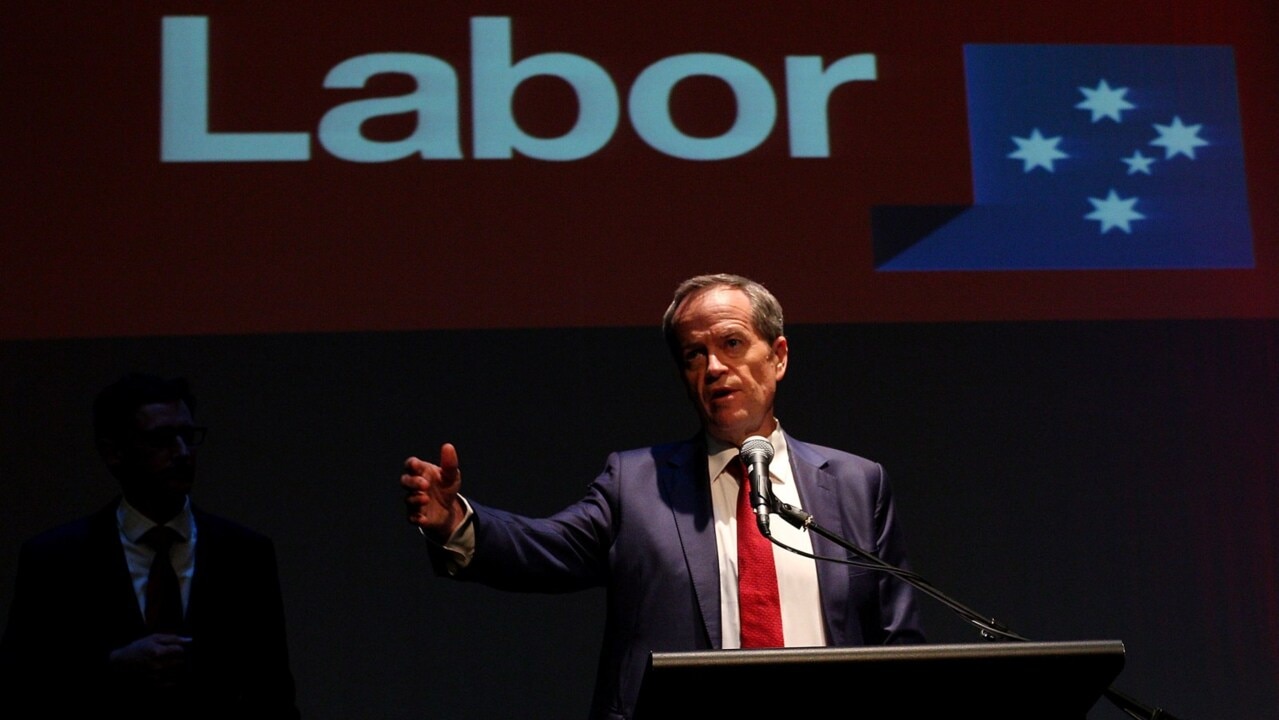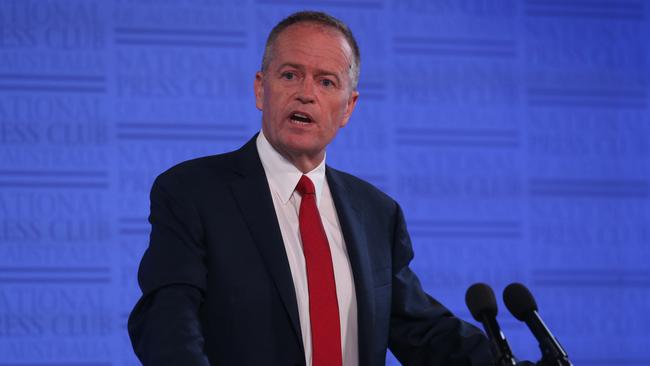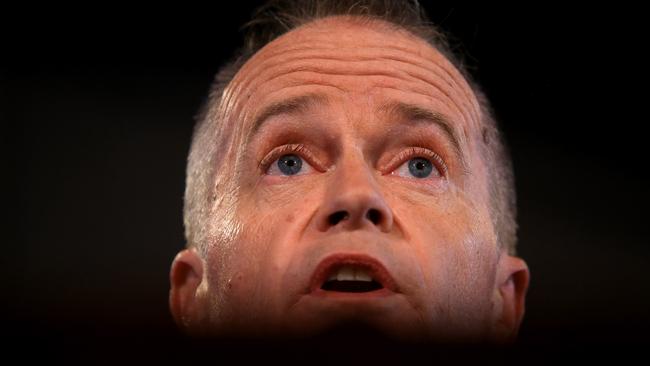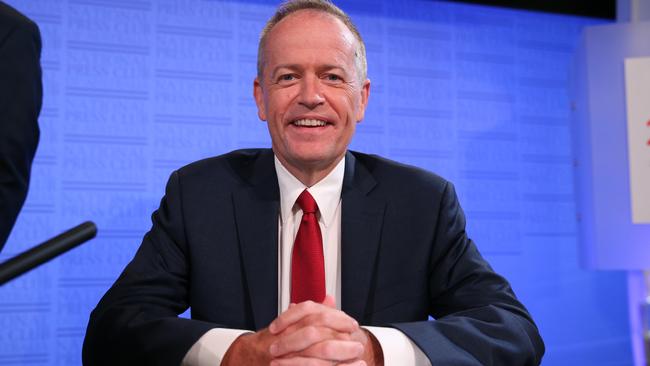Bill Shorten uses speech to push anti-corruption watchdog, wages growth
Bill Shorten uses a key speech to slam big business for deliberately keeping worker wages low as household bills soar.

Bill Shorten said his vision for the economy was to increase the pay packets of all Australians, particularly those earning a minimum wage.
In a landmark speech at the National Press Club, the Opposition leader said the cost of living was rising, and governments needed to demonstrate that politics had the capacity to make the economy work for working Australians.
“Household bills are simply through the roof. Things have always gone up — people understand that. The big difference is this time the wages are staying down,” he said.
“Our economy has grown since the Global Financial Crisis, workers are more productive than ever, company profits went up 20 per cent last year alone.
“So why are big companies keeping workers’ wages low? It’s the same reason that they’re farming people out to labour hire companies, the same reason that they try to turn every job they can into a casual job, the same reason that CEOs can put up their own pay and up again. It is because they can.”
Mr Shorten said the Turnbull government had responded to low wage growth by attacking unions and backing cuts to weekend penalty rates.
“These are companies and CEOs whose profits and pay packets come from the hard work of Australians. We buy their stuff, we use their services. But if we don’t have the right rules and strong standards, if we don’t push big companies to pay a fair day’s wage for a fair day’s work, if we don’t demand a better deal and greater security for working Australians, then it just won’t happen.”
The former AWU national secretary said he had spent two decades representing workers.
“That taught me that without representation corporations do not just hand out pay rises to their employees,” he said. “You have to argue for it, to organise for it. That’s even if it means taking on vested and powerful interests.”
Mr Shorten said the wage system was no longer delivering. “It’s not just cuts to penalty rates or the exploitation of labour hire,” he said. “Enterprise bargaining itself is on life support. It should be a driver of both wages growth and productivity but the number of enterprise agreements ratified by the Fair Work Commission last year was the lowest number since 1995 when the enterprise bargaining system was in its infancy.
“Now the game of snakes and ladders is simply a game of snakes for workers. For people who can’t bargain together, they are on the minimum wage that’s been going backwards relative to media wages for years.

“This disadvantages employers who do the right thing and negotiate. I was brought up in a system that said you wanted employees and employers to negotiate together to create value, growth and productivity and in return better conditions.
“We now have a system that creates incentive and rewards the employers who are not interested in negotiating. That sets everyone back.’’
Mr Shorten also highlighted rising health insurance premiums, pledging to crack down on junk health insurance policies. “As someone wryly remarked last week there used to be two certainties in life, death and taxes. Now there’s three: death, taxes and big increases in health insurance premiums,” Mr Shorten said.
“For years premiums have been rising at triple the rate of inflation, way above the pace of wages. Families are paying an average of more than $1000 they were when the Liberals were elected in 2013. Australians are paying a lot more for their health insurance policies and getting a lot less. Ten years ago only 8.6 per cent of health insurance policies contained exclusions, now it’s 40 per cent.’’
Mr Shorten said the health insurance industry was receiving $6bn in taxpayer-funded subsidies a year.
Bill Shorten answered questions on ...
Company tax cuts
Mr Shorten said Labor would continue to oppose tax cuts for large businesses, but would finalise its position after the May budget.
He said Labor supported the tax cut for businesses with turnover of up to $2m which has already been legislated.
“For the record that’s 87 per cent of businesses,” Mr Shorten said.
“The case has not been made by this Government to give companies with very large turnovers tax relief.
“The fact of the matters is that with many of these companies, the profits will be returned to foreign shareholders.
“The fact of the matter is there is no guarantee - we haven’t seen it happen because there’s been corporate tax cut reductions - they have not been handed to workers in increased wages, so we will finalise our policy in response after this budget.”
Mr Shorten said the company tax cuts would cost other parts of the budget.
Negative gearing
Mr Shorten was asked about Labor’s negative gearing policy, given the expectation that property prices growth will continue to slow, if not go backwards, in the Sydney and Melbourne markets.
The Opposition Leader side-stepped the question, referring to the revelation earlier this month that the government had withheld advice from Treasury showing Labor’s negative gearing and capital gains tax policies would probably have a “small” impact on property prices.
“One issue which penetrated my consciousness as (I was) sitting on the beach was the revelation the Treasurer had looked at our policy on negative gearing and found out the government had been a tad naughty in the way they characterised it,” he said.
“It’s a good policy. We’re sticking to it. It will help, I think ease some of the price pressures on housing.
“I think the longer term question is why is the government so determined to give priority to investment speculators over people trying to their first home?
“I would suggest to you that while there are points in what you say about housing prices going down, or apartments or in some regions, go and speak to
families at the next auctions and see if they think prices are going down.
“I don’t want people who don’t have rich parents who can help them to be left behind.”
David Feeney
Mr Shorten declined to say whether or not he had advised Victorian MP David Feeney to resign rather than wait for the High Court to deal with his citizenship case.
Should Mr Feeney resign or lose his High Court case, he is likely to face a fierce battle with the Greens to retain his inner northern Melbourne seat of Batman.
“David did the right thing by referring himself to the High Court when he couldn’t discover papers to demonstrate things,” Mr Shorten said.
“I think he has the right to prepare his case and I’m letting him do that.”
Adani mine
Mr Shorten was also non-committal on the issue of the Adani mine in Queensland’s Galilee Basin, saying that if it didn’t stack up commercially or environmentally it would “absolutely not” receive Labor’s support, but indicating no decision had yet been made.
Despite living 2000 kilometres from the mine, activists plan to hold a “Stop Adani Batman by-election” launch party in the inner northern Melbourne seat this evening.
“I’ve said about the Adani project that it has to stack up commercially and environmentally,” Mr Shorten said, referring to his recent visit to the Great Barrier Reef.
“I was very fortunate to be able to visit the reef last week and talk to some of the experts and talk to landholders and environmentalists about the project,” he said.
“I think it’s fair to say that the reef is under great stress. The reef is still there. People should go there. But I think that the reef has done so much in the way of jobs - it’s arguably our greatest natural asset. I do think we need to do more to protect the reef.”
Mr Shorten said he understood that there was “legitimate concern” about the Adani project.
“Some people say that we should be concerned because the banks won’t back it.That is a point,” he said.
“Others say that we should be concerned because there’s a glut of this coal on the international market. Others say we should be concerned about the project because it might jeopardise the job security of other coal mining regions of Australia.
“Others have pointed to me the concerns about the Great Artesian Basin and the lack of clarity about whether or not the open cut processes of Adani will interfere with the basin.
“You can’t be serious about climate change and energy and have a bet every which way. We’re’ looking at Adani closely. If it doesn’t stack up commercially or environmentally it will absolutely not receive our support.”
Enterprise bargaining
Mr Shorten flagged changes to the enterprise bargaining system which could remove employers’ powers to terminate agreements.
“The ability of companies to unilaterally terminate agreements and say to workers on $60-80,000 a year, that unless you take a wage cut we will put you back on the award, which could be $25-30,000, that is unfair,” Mr Shorten said.
“We don’t think that should be allowed. I think existing agreements should stay in place until they’re renegotiated by mutual agreement.
“The distance between the minimum and median wage is growing.
“You are seeing the jobs’ growth happening at the low end of the market where wages are not increasing and people are squeezed, so I do think we need to have a look not just at the minimum wage but what is the living wage.”
Private health insurance
Mr Shorten said Labor was working through “a number of options” to reform the private health insurance system, and did not rule out changes to the rebate.
“I put private health insurance, the big end multinationals on notice,” he said.
“Business as usual does not work if you are getting a $6bn subsidy from the taxpayer yet making record profits and the prices and exclusions are going up. That is a problem.
“They are not the sole player in the system, it’s complex, but I’m committed to consultation, working through the issues but for private health insurance, I want to save it.
“You won’t save it by increasing the prices. They’ve gone up a thousand bucks since the Liberals went in.”
Asked whether he would threaten to withdraw the government subsidy, Mr Shorten said he would talk to the insurers.
“Business as usual is not cutting it,” he said.
Pressed again, Mr Shorten said, “let’s not put the cart before the horse”.
“I think the fees have increased too much. I think premium rises are too high,” he said.
“There needs to be better monitoring of exclusions. This has to be done with the industry as well as talking about it. I’m sure we can get a better deal.”
Australia Day
Quizzed on former leadership rival Anthony Albanese’s idea of having a double referendum on a republic and indigenous recognition to reframe the meaning of Australia Day, Mr Shorten said it was “an interesting idea”.
“Albo and Noel Pearson, a range of people have commented on what to do on Australia Day,” he said.
“But I think the more substantial point which he made and which I’ve made previously is we should have an Australian head of state.
“Australia’s been around, modern Australia, for around since 200-plus years. It’s time for us to have our own head of state. That is a priority.”
Mr Shorten also called for recognition of indigenous Australians in the constitution to be prioritised, and them to be given a voice according the the Uluru Statement from the Heart.
“They are my two priorities - the voice, and then the Australian head of state,” he said.
“In terms of Australia Day, I’m sure there’s plenty of more interesting discussions to come on that.
“What I won’t do, though, again, I thought Malcolm was perhaps ill-advised to sneer at the people who want to debate changing the day. It’s a free country. We’re allowed to express our views. There are legitimate alternatives. On that basis we will keep looking at that issue.”
A national integrity commission
A recent Public Service Commission submission argued that a national integrity commission would likely be expensive, unnecessary and may not find any more corruption than public agencies currently do.
Mr Shorten said he was confident that an anti-corruption body would find problems, and play a “leadership role” in lifting the general standard of ethics.
“I think it’s now time for the Commonwealth to do that,” he said.
“I do believe we need to have a national integrity commission. While we have a range of agencies who do some of the functions, it is clear when you study it, that there are inconsistencies and gaps.
“I think a national integrity commission as we design it can look at where we can include any of those functions currently performed by other bodies.
“I have no doubt that Australian people do want us to see us step up.”

Structure of new national integrity commission
Mr Shorten said he was indebted to Transparency International and a range of senior judges and people involved with state anti-corruption commissions for the structure of his proposed new national integrity commission.
The commission would include a commissioner and two deputies, each appointed for a single five year term.
“After discussion with them and my shadow attorney-general, Mark Dreyfus, we formed a view this position is so powerful one term is enough,” he said.
Mr Shorten said he envisaged the new Independent Parliamentary Expenses Authority set up by the Turnbull government would continue to be the primary body for dealing with politician expense scandals.
“The remit of the National Integrity Commission is this: we want to make sure the administration of the commonwealth is impartial and free from untoward
influence,” he said.
“So what we’re proposing is it would cover the judiciary, it would cover the commonwealth public service, businesses and people who transact with the commonwealth and the Governor-General. So it would have a broad remit.
“I also say to the government ... we are happy to work with them. It doesn’t have to be a Labor-Liberal Punch and Judy show.
“Specifically the appointment of the commissioner will be done by the parliament, not a Liberal appointee or a Labor appointee, but a parliament appointee.”
Asked whether the integrity commission would have looked into disgraced former Labor senator Sam Dastyari’s donations scandal, Mr Shorten said he would not play national integrity commissioner.
“We want to see donations reform in addition (to a national integrity commission),” he said.
“We think that foreign donations to political parties should be stopped - my party’s already stopped that.
“We think there should be transparency of donations
over $1,000. I don’t see the national integrity commission as the only reform.”
The most damaging Labor behaviour in 2017
Mr Shorten said 2017 had been a particularly bad year for federal politics and people had lost trust.
Asked what he saw as the most damaging recent example from Labor, Mr Shorten said it was a “collective responsibility” to lift the tone.
“I think the citizenship debate made us all look like we’re just focused on ourselves and not the needs of ordinary people,” he said.
NSW train strike
Mr Shorten was asked whether he agreed with ACTU Secretary Sally McManus that the fact that the NSW train strike did not go ahead was “the sign of a broken system”.
He said he hadn’t followed the train dispute closely, but believed the main problem was that NSW was relying on overtime to get trains to run.
Mr Shorten said his broader point about the economy was that it wasn’t working for working people.
“The broader system I’m saying about the system not working is that traditionally there’s a classic economic theory we’ve been brought up on that says as job markets tighten, wages go up. That’s not happening,” he said.
“I think even conservative economists who perhaps traditionally wouldn’t support seeing wages move are actually forming an coalition with unions and others who say that what’s holding it back is a lack of confidence.

“I would say that the lack of confidence is too many people left behind.
“When you see power bills increasing at multiple times the level of wages - that’s a problem.”
Pressed again on whether the Fair Work Commission acted appropriately in removing the right to strike, Mr Shorten said the ability to bargain was important.
“Of course people have always had the right to take legally-protected industrial action,” he said.
“For me, if you like, the question about the strike is the wrong way around. The problem is we have companies terminating agreements. Business doesn’t want to bargain any more”
‘Corruption as serious as national security’
Bill Shorten has used a landmark speech at the National Press club to call for a national corruption watchdog, framing the issue as a means of restoring confidence in Australia’s democratic system and public institutions.
The Opposition Leader said a Shorten Labor government would create a National Integrity Commission in its first year in power, saying the issue of corruption should be treated with the same seriousness as National Security.
“This question is far bigger than Malcolm verses me or Liberal verses Labor,” Mr Shorten said.
“The most corrosive sentiment, awash in western democracies around the world, is the idea that politicians are only in it for themselves.
“It’s simply not true. It’s not true of me or Tanya or any of our team. In fact, it’s not true of nearly everyone I’ve ever come across in politics in my ten years in Parliament, from all viewpoints and all political parties.
“But so long as the political news is dominated by the minority who do the wrong thing — the travel rorts and dodgy donors and where cabinet ministers walk one day from their job and the next into a cushy job in the same sector — then we will always have a hard time convincing the Australian people we’re serving their interests and not our own.
“So, business as usual, politics as usual, won’t cut it in 2018.”
Mr Shorten said his federal integrity commission would be set up based on lessons learned from state anti-corruption bodies.
“The national integrity commission will resolve the gaps and inconsistencies in the current system, designed to ensure the highest standards in public administration,” he said.
.@billshortenmp says his proposed National Integrity Commission will help restore trust, accountability and transparency in the Commonwealth sector. https://t.co/PQuK2F2ufg pic.twitter.com/NnOiNMOrmj
— Sky News Australia (@SkyNewsAust) January 30, 2018
“We want to get it underway within our first year of government. If the Liberals and Nationals want to work with us to get it done sooner — be my guest.
“This is not about partisanship, it is about trust.
“I’m not putting this policy forward because I’m aware of any corrupt conduct — if I was, I would report it.
“I’m doing this because I want to restore people’s faith in their representatives and their system of government.”
Mr Shorten said his new watchdog would be independent and well-resourced, with a broad jurisdiction, “effectively operating as a standing Royal Commission — with all those investigative powers — into serious and systemic corruption in the public sector.”
The commission would have the discretion to hold public hearings, have one commissioner and two deputies, appointed by parliament on a bipartisan basis and each serving a single, fixed five-year term.
“The Commission would make findings of fact, not law, and then refer them to the Commonwealth Department of Public Prosecutions, if appropriate,” Mr Shorten said.
“It would report to parliament annually — overseen by a Joint Standing Committee.
“This is a big move — it’s not a decision my colleagues and I have taken lightly.
“I’ve personally met with and spoken to experts about the principles I’ve outlined to you today. I want the national integrity commission to be a clear, concrete and impartial mechanism to restore trust, accountability and transparency in the public sector.
Shorten no corruption warrior: PM
Earlier the Prime Minister said Mr Shorten’s call for a federal independent commission against corruption may be a “shot across the bows” of former leadership rival Anthony Albanese, who has previously opposed the move according to Malcolm Turnbull.
Mr Turnbull said the government was currently reviewing a Senate committee report on the issue and had not ruled out a federal ICAC.
“There hasn’t been an ICAC set up federally in the past because both sides of politics, and in particular Anthony Albanese’s been strongly against it,” the Prime Minister said.
“I wonder whether Bill’s having a shot across Albo’s bows with that. I will leave the Labor Party political commentary to you guys. But it hasn’t been supported in the past.”
Mr Turnbull said the federal government already had extensive anti-corruption measures through the Australian Commission for Law Enforcement Integrity and related agencies, including the AFP’s anti-corruption unit.
.@TurnbullMalcolm: '@billshortenmp's credibility on the question of corruption is pretty tattered. He did everything he could to prevent the exposure of union corruption time & time again; the CFMEU above all. He is no anti-corruption warrior' MORE: https://t.co/6MIdOckL8J pic.twitter.com/oe9cQZzYDn
— Sky News Australia (@SkyNewsAust) January 30, 2018
“I have to say, though, you know, Bill Shorten’s credibility on the question of corruption is pretty tattered,” he said.
“This is a guy who has done everything he could to prevent the corruption in the union movement, corruption between unions and business being exposed.
“He fought tooth and nail to oppose the Heydon royal commission into trade union corruption.
“We saw his own union, the AWU, has been shown up with several shocking examples, including a number of senior officials of the AWU have been identified and of course the CFMEU above all.”
Mr Turnbull said Mr Shorten had done everything he could to prevent parliament passing legislation to establish the Registered Organisations Commission, “whose duty is to ensure that unions are run transparently and honestly and for the benefit of their members and not engage in corrupt practices.”
“So, Bill Shorten is no anti-corruption warrior, but as far as the national integrity commission, it is something we are reviewing the report from the Senate committee and considering it,” he said.
“Obviously in anything like that the devil will always be in the detail. As we all know, if you look around the states and territories, some of the ICACs have worked better than others.
“So, there is a lot of experience to learn from. It isn’t something to embark on in a rushed or ill-considered way.”






